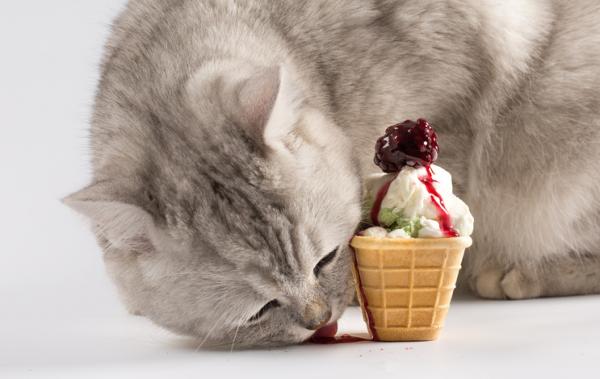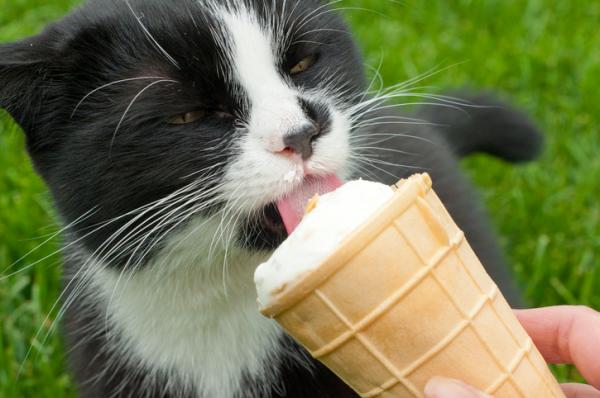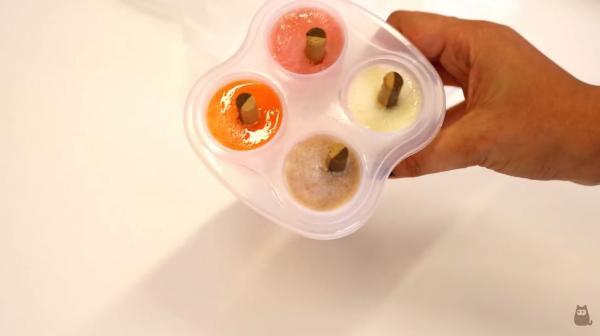Can cats eat ice cream?

Surely you have seen circulating on the Internet various videos that show cats trying ice cream from their human friends. After a few seconds, the cats show the characteristic expression of what we call “frozen brain”.
Before running to try it too, you should ask yourself if you can give cats ice cream. Although ice cream is irresistible to humans, it is harmful to cats. Keep reading this article and discover why cats should not eat ice cream.
Can you give the cats ice cream?
Eating a delicious ice cream and feeling that your brain is “frozen” is not pleasant, and you know it. When watching the videos of cats having the same reaction, you will ask yourself, what is happening? Do cats also have their brains frozen? The truth is that yes, felines have a similar response because in their organism the same thing happens in our organism when they eat something too cold very fast. Now, what exactly happens? Here we explain it to you!
By ingesting a very cold food at high speed, the body is “taken by surprise”, so the arteries dilate at high speed and affect the trigeminal nerve, called fifth cranial nerve, which, among other functions, is responsible for carrying to the brain the information about the stimuli received at buccal and mandibular levels. The discomfort starts in the mouth, going to the throat and all the nerves in the surroundings. This is what gives the sensation of frozen brain, which in medicine receives the name of ganglioneuralgia sphenopalatine. Therefore, and other reasons such as the amount of sugar, it is not recommended to give ice cream to cats.
The result of sphenopalatine ganglioneuralgia is not only a general confusion of the senses, but also acute pain and migraine. In conclusion, something not at all pleasant. The same thing happens to your cat, so this pain is the first reason why you should not give him ice cream.
Cats hate the cold
Anyone with a cat at home knows how much they enjoy spreading all their legs and lying belly up in the rays of the sun. They love it and can spend hours in this position. In autumn and winter, and in the absence of sun, cats cuddle in the warmer places of home, near stoves, appliances, or simply among the most fluffy and warm blankets that are able to find.
This is because for felines the cold is really unpleasant. His body temperature is a little higher than ours (between 38 and 39 degrees Celsius), so they easily feel cold. So, even if eating ice cream is something delicious for you, it will not be your cat’s favorite activity!
Problems with sugar?
Taste buds of cats they do not detect the sweet flavors and sugary, so if you think that by giving ice cream your cat will think it is very rich, the truth is that you can not even perceive its true flavor. The reasons that explain why cats do not have the sense of sweet are not very clear, but it is believed that it may be a natural safety mechanism, since sweets are rampant in the feline organism.
What happens when you give something sweet? Well, it will have colic, gas and stomach upset. It is even possible that eating ice cream produces cat diarrhea, so sweets are forbidden for your cat and, therefore, also ice cream.
Lactose intolerance?
The cartoons have been responsible for introducing us to cats as milk lovers. There are innumerable scenes of kittens stealing bottles of milk, or waiting anxiously to fill their plates with this food. However, the truth is that the milk that humans consume, which mostly comes from cows, contains too much fat for the stomach of the cats, so when they drink it, they indigestate easily and suffer from diarrhea and gas. If this discomfort is prolonged, the cat becomes dehydrated, seriously endangering his life. Of course, this situation does not happen in all felines, since those cats that have consumed milk since they were small and have continued to do so during adulthood may not develop intolerance to lactose or show any type of negative singo. More information in our article “Can cats drink milk?”.
Milk and dairy products are part of the main ingredients with which ice cream is made, so this is another reason not to give ice cream to your cat, especially if it has symptoms of intolerance.

And if it’s chocolate?
Chocolate is the delight of the gods for most people, and it has even been seen that many cats like to steal a piece of something full of chocolate. However, did you know that it is toxic to cats? So is!
The chocolate contains theobromine, a compound that is found in the cocoa shell and that stimulates the nervous system similar to caffeine. The body of cats is unable to process this substance, so if you let it consume it often it slowly builds up in the body. The discomfort includes stomach problems such as diarrhea and cramps, as well as vomiting and polydipsia. Prologue and excessive consumption causes the death of the animal. Of course, in case of consuming a small dose of chocolate, the animal does not have to show signs of intoxication, the problem lies when the amount ingested is very large or, as we say, is consumed frequently.
After seeing these 5 reasons, you know that cats can not eat ice cream! But there are exceptions? Coming up next, we tell you.
And if it’s natural, can cats eat ice cream?
If the ice cream is homemade and has been made with natural fruit, milk without lactose and no sugar, It is possible that a cat can eat it. However, in order to prevent the sphenopalatine ganglioneuralgia from occurring, it will be essential to take the ice cream out of the freezer in advance and offer it to the animal much less cold. Likewise, it should be given as a prize or a treat and, preferably, during times of more heat, since it may be another way to combat dehydration.
To know which fruits can be used to make homemade ice cream for cats, we recommend to review the article on “Recommended fruits for cats”.

If you want to read more articles similar to Can cats eat ice cream?, we recommend that you enter in our section of Homemade Diets.


